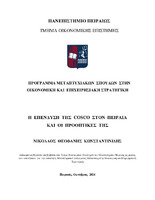Η επένδυση της COSCO στον Πειραιά και οι προοπτικές της
COSCO's investment in Piraeus and its prospects

View/
Keywords
Άμεσες ξένες επενδύσεις ; ΑΞΕ ; FDI ; Λιμάνι Πειραιά ; ΟΛΠ ΑΕ ; Οργανισμός Λιμένος Πειραιώς ; COSCO Shipping ; ΣΕΠ ; PCT ; Belt and Road Initiative ; Νέος Δρόμος του Μεταξιού της Κίνας ; Μία Ζώνη Ένας Δρόμος ; Έσοδα λιμενικών δραστηριοτήτων ; Έξοδα λιμενικών δραστηριοτήτων ; Σταθμός εμπορευματοκιβωτίων ; Container terminal ; Σταθμός διακίνησης αυτοκινήτων ; Car terminal ; Κρουαζιέρα ; Cruise terminal ; Ναυπηγοεπισκευή ; Ship repair zone ; Σταθμός ακτοπλοΐας ; Ferry terminal ; Ανάλυση P.E.S.T.L.E. ; Ανάλυση S.W.O.T. ; Ερωτηματολόγιο ; Στατιστική ανάλυσηAbstract
PPA S.A. (Port Piraeus Authority) is a listed company on the Athens Stock Exchange,
which manages and operates the Port of Piraeus, the largest Port in Greece and one of the most integrated Ports in Europe in terms of port services.
Activities at the Port of Piraeus include cruise, passenger transport, container and car
terminal, shipyard, logistics and free zone services. The position of Piraeus is strategic, being the first European Port after the Suez Canal with a direct connection to the EU road and rail network. COSCO Shipping, one of the largest shipping companies in the world, invested in the first Port of Greece, initially, in 2008, when, after an international tender acquired the management of containers Terminal II and III for 35 years, establishing the company PCT (Piraeus Container Terminal) S.A. (Law 3755/2009).
Later, in 2016, COSCO acquired the share capital of PPA SA, with a percentage of 51%, following an international tender (Law 4404/2016) and today, COSCO is the main shareholder of PPA SA, with a percentage of 67% (N. 4838/2021). COSCO's foreign direct investment (FDI) in the Port of Piraeus is part of China's strategy known as "The Belt and Road Initiative".
This Master Thesis studies COSCO's investment in four (4) levels: in that of the general
strategy, in the context of the Greek and Chinese economy, i.e. the importance of the investment, in its main aspects, in the Port of Piraeus (Chapter 1), in that of the complex legislative intervention for the implementation of the investment (Chapter 2), in that of the economic efficiency of the investment, in all the sectors of activity of the Port of Piraeus (Chapter 3) and in that of the future prospects of the investment, using the P.E.S.T.L.E. analysis. and S.W.O.T., with reference to the strategy and vision of COSCO / PPA S.A. citing, among other things, the most recent financial results and, finally, by processing the answers from a special questionnaire, which was sent to users of PPA S.A.'s port services (Chapter 4) and on which a statistical analysis was conducted (Annex).
Today the Port of Piraeus has surpassed the Port of Hamburg as a global shipping center. However, whether COSCO's investment in the Port of Piraeus will continue to generate sustained upward profitability remains to be seen. Only in the near future will it be proven with certainty whether the strategic position of Greece’s largest port, combined with COSCO’s extensive network and China's Belt and Road Initiative, will prevail over the significant business risks inherent in the ongoing (and largely unpredictable) geopolitical instability in the Mediterranean region, Europe, and globally.


